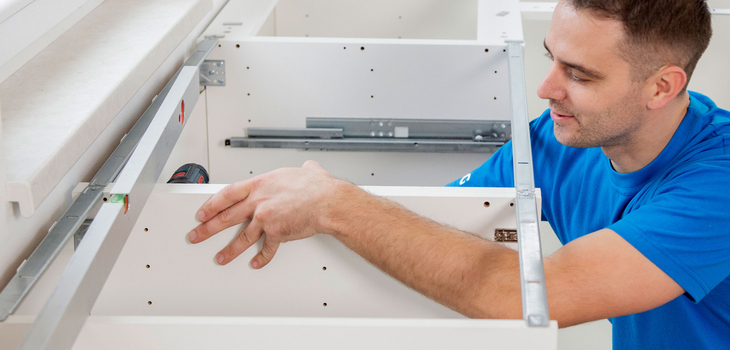Anpassen an den Wandel: Herausforderungen in der Küchenmontagebranche meistern

Gestiegene Materialkosten
Wie andere Sektoren auch, hat die weltweite wirtschaftliche Notlage auch die Küchenmontagebranche getroffen. Die Schwankungen bei den Rohstoffpreisen, Wechselkursen und Zöllen wirken sich negativ auf die Produktionskosten und die Gewinnspanne in der Branche aus.
Schwierige Suche nach qualifizierten Arbeitskräften
Die Zahl der verfügbaren Facharbeiter und Techniker nimmt von Tag zu Tag ab. Daher ist es schwierig, Fachkräfte für die Küchenmontage zu finden. In Zeiten niedriger Arbeitslosigkeit sind Fachkräfte seltener zu finden, so dass die Branche einen Personalmangel und eine Qualifikationslücke erlebt.

Die Küchenmontage ist mit verschiedenen Herausforderungen konfrontiert. Meistens ergeben sich diese Herausforderungen aus den Trends in der Branche. Die Welt entwickelt sich weiter, und zu wissen, wie man mit diesen Herausforderungen umgeht, ist entscheidend für den Erfolg in der Branche.
In diesem Blog werden wir uns mit den Herausforderungen befassen, mit denen die Küchenmontagebranche konfrontiert ist. Wir werden sehen, wie man die Herausforderungen in der Küchenmontage erfolgreich meistert und sich an den Wandel anpasst.
Die Küchenmontage ist ein dynamischer Wirtschaftszweig, der für die Gestaltung moderner Wohnungen unerlässlich ist. Im Laufe der Jahre ist der Bedarf an einer funktionalen und ästhetisch ansprechenden Küche gestiegen. Mit den steigenden Anforderungen wachsen auch die Herausforderungen an die Dynamik der Branche.
Diese Herausforderungen müssen angegangen werden, damit die Branche relevant bleibt und ein nachhaltiges Wachstum verzeichnen kann. Außerdem hilft es der Branche, sich besser zu positionieren, während sie sich durch den ständigen Wandel in der Branche bewegt.
Die wichtigsten Herausforderungen für Küchenmonteure und -monteurinnen
Die Küchenmontagebranche steht vor Herausforderungen, die eine sorgfältige Navigation und strategische Positionierung erfordern. Im Folgenden sind einige davon aufgeführt:
Unterbrechung des Lieferkettensystems
Die meisten der von der Küchenmontagebranche verwendeten Rohstoffe stammen aus dem globalen Lieferkettensystem. Daher sind sie bei Rohstoffen, Fertigprodukten und anderen Komponenten stark davon abhängig. Leider haben Unterbrechungen wie Handelsstreitigkeiten, erhöhte Produktionskosten und Naturkatastrophen die Lieferkette beeinträchtigt und zu Verzögerungen und Engpässen in der Branche geführt.
Dynamische Verbraucherpräferenzen
Die Vorlieben der Verbraucher für ihre Küchenausstattung entwickeln sich ständig weiter. Die meisten Menschen passen ihr Küchendesign an Trends, kulturelle Einflüsse und Technologien an. Das macht es für die Branche schwierig, mit den Veränderungen Schritt zu halten. Außerdem ist es zeitaufwendig und mühsam, auf die Bedürfnisse der einzelnen Kunden einzugehen.
Einhaltung gesetzlicher Vorschriften und Qualitätsstandards
Auf der ganzen Welt ist es wichtig, dass die gesetzlichen Vorschriften und Qualitätsstandards deines Sektors strikt eingehalten werden. Die Küchenmontage ist da keine Ausnahme; auch sie hält sich an die Regeln und Vorschriften, um Produktsicherheit und gute Leistung zu gewährleisten. Die Anpassung an Gesetzesänderungen und die Durchführung regelmäßiger Kontrollen kann jedoch aufgrund der Dynamik der Branche schwierig sein.
Konkurrenz durch Online-Händler
Der technologische Fortschritt hat dazu geführt, dass die Zahl der E-Commerce- und Online-Händler gestiegen ist. Dies hat den Wettbewerb zwischen den traditionellen und den Online-Händlern verschärft, da sie um die gleiche Anzahl von Kunden konkurrieren.
Rasche Weiterentwicklung der Technologie
Neue technologische Hilfsmittel wie Augmented Reality (AR) und intelligente Geräte verändern das Bild der Küchenmontagebranche. Es ist jetzt schwierig, mit den neuen Veränderungen Schritt zu halten, die von Zeit zu Zeit auftauchen.
Schwierigkeit, umweltfreundliche Praktiken aufrechtzuerhalten
Die Verbraucherinnen und Verbraucher sind in den letzten Jahren umweltbewusster geworden und verlangen nach umweltfreundlichen und geeigneten Küchenlösungen. Es kann jedoch einige Zeit dauern, mit diesen nachhaltigen Praktiken Schritt zu halten, da die Verbraucher unterschiedliche Vorlieben haben und verschiedene Küchenlösungen benötigen.
Strategien für eine erfolgreiche Anpassung an die Veränderungen in der Branche
Sich an Veränderungen anzupassen bedeutet, dass du Strategien und einen proaktiven Ansatz haben solltest. So kannst du dich kontinuierlich an die Marktdynamik in der Küchenmontagebranche anpassen. Im Folgenden findest du einige Strategien, die dir dabei helfen, die Herausforderungen der Branche zu meistern:
Marktbeobachtung
Als Branche musst du dich durch sorgfältige Recherche über neue Trends und die Dynamik des Marktes auf dem Laufenden halten. Du kannst auch die Strategien der Wettbewerber, die Vorlieben der Verbraucher und die jüngsten Entwicklungen in der Branche untersuchen, um Chancen schnell zu erkennen und zu nutzen.
Führe ein flexibles Geschäftsmodell ein
Du solltest dir ein flexibles Geschäftsmodell zulegen, das sich schnell an die sich verändernden Marktbedingungen anpassen kann. Das kannst du erreichen, indem du dich in Teams aufteilst und zusammenarbeitest, Innovationen entwickelst und neue Ideen umsetzt, damit die Branche immer einen Schritt voraus ist.
Mit den technologischen Fortschritten Schritt halten
Die Industrie sollte sich neue technologische Innovationen zu eigen machen, um die Effizienz der Küchenmontage zu steigern. Dazu kannst du in fortschrittliche Fertigungstechnologien wie computergestütztes Design und Roboterautomatisierung investieren.
Individualisierung und Personalisierung
Um auf die vielen Vorlieben der Kunden einzugehen, kannst du maßgeschneiderte und personalisierte Lösungen für die Küchenmontage anbieten. Auf diese Weise zähmst du ihren Appetit auf das, was die Industrie anbieten kann. Außerdem kannst du digitale Planungstools und interaktive Plattformen nutzen, um Kunden und Fachleuten die Möglichkeit zu geben, gemeinsam den idealen Kochbereich und andere Küchendienstleistungen für den Kunden zu gestalten.

Optimiere das Lieferkettensystem
Du kannst das Lieferkettensystem optimieren, indem du deine Lieferanten diversifizierst und die Lieferzeiten verkürzt. Außerdem kann die Branche mit wichtigen Interessengruppen wie Lieferanten, Händlern und Logistikern zusammenarbeiten, um die Zahl der verspäteten Lieferungen zu verringern.
Umweltfreundliche Praktiken einführen
Die Branche sollte umweltfreundliche Praktiken in alle Bereiche integrieren, einschließlich Produktdesign, Herstellung und Vertrieb. Du kannst erneuerbare Materialien verwenden, um den Abfall zu minimieren und den Energieverbrauch zu optimieren. Außerdem muss sich die Branche bei ihrer Arbeit an Umweltstandards halten.
Priorisiere die Kundenzufriedenheit
Mit dem Aufkommen von sozialen Medien und Online-Händlern ist es heute schwierig, Kunden zu gewinnen. Daher solltest du der Kundenzufriedenheit und der Kundenbindung Priorität einräumen, indem du außergewöhnliche Produkte, Dienstleistungen und Support anbietest, um mehr Kunden zu gewinnen. Höre ihnen zu, schätze ihr Feedback und passe deine Küchenlösungen an ihre Bedürfnisse an. Auf diese Weise baust du langfristige Beziehungen zu deinen Kunden auf.
Rekrutierung, Schulung und Bindung von Talenten
Da es ein Problem sein kann, qualifizierte Arbeitskräfte zu finden, sollte die Branche in die Anwerbung, Ausbildung und Bindung von Fachkräften für die Küchenmontage investieren. Außerdem fördert sie eine Kultur der Kreativität, des Lernens und der Eigenverantwortung, um qualifizierte Fachkräfte für die Branche zu gewinnen.
Fazit
Die Küchenmontagebranche steht vor vielen Herausforderungen. Daher ist es wichtig, Wege und Strategien zu finden, um sie zu meistern. Mit den oben genannten Strategien sind wir sicher, dass die Küchenmontage in der Lage sein wird, die Veränderungen in der Branche zu meistern, der Konkurrenz einen Schritt voraus zu sein und sich auf dem Markt zu behaupten.
Wir von Moovick bringen dich mit Küchenmontage-Dienstleistern zusammen, mit denen du auf dem Markt rechnen musst.
Beliebte Artikel

Fahre, verdiene und erkunde München: Starte noch heute deine Karri...

Industrielle elektrische Sicherheitsprotokolle: Bewährte Praktiken...

Wie man ohne Geld ein erfolgreiches Unternehmen gründet

6 bewährte Methoden zur Optimierung der B2B-Logistik

Wie Moovick AI die Gewinnaussichten für Handwerker revolutioniert

10 wichtige Schritte zur Vorbereitung deines lokalen Umzugs

